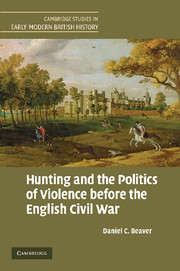Book contents
- Frontmatter
- Contents
- List of maps
- Acknowledgments
- List of abbreviations
- Introduction: Hunting, violence, and the origins of the English Revolution
- 1 Blood, sacrifice, and order: meanings of the forest and hunt in culture, politics, and society
- 2 Honor, property, and the symbolism of the hunt in Stowe, 1590–1642
- 3 Ancient liberties and the politics of the commonweal in Waltham Forest, 1608–1642
- 4 Royal honor, great parks, and the commonweal in Windsor Forest, 1603–1642
- 5 Venison and the politics of honor in Corse Lawn Chase, 1620–1642
- Conclusion: Royal symbols, forest politics, and popular politics in early modern England
- Bibliography
- Index
- Titles in the series
Conclusion: Royal symbols, forest politics, and popular politics in early modern England
Published online by Cambridge University Press: 06 March 2010
- Frontmatter
- Contents
- List of maps
- Acknowledgments
- List of abbreviations
- Introduction: Hunting, violence, and the origins of the English Revolution
- 1 Blood, sacrifice, and order: meanings of the forest and hunt in culture, politics, and society
- 2 Honor, property, and the symbolism of the hunt in Stowe, 1590–1642
- 3 Ancient liberties and the politics of the commonweal in Waltham Forest, 1608–1642
- 4 Royal honor, great parks, and the commonweal in Windsor Forest, 1603–1642
- 5 Venison and the politics of honor in Corse Lawn Chase, 1620–1642
- Conclusion: Royal symbols, forest politics, and popular politics in early modern England
- Bibliography
- Index
- Titles in the series
Summary
alderman It seems there is a commonwealth in a park…
keeper The king's majesty's parks, chases, and forests are liberally bestowed. But they that steal a deer off the king's ground, the horns may hereafter chance to choke them. They that steal deer, trees, lands, and all, the very stones will fly in their faces…
Man in the Moon [John Crouch], Second Part of Newmarket Fair (1649)The symbolism of hunt and forest became significant partisan political markers following the Civil War and Revolution. Knowledge and expertise in the hunt, and respect for its exclusions, became a test of reverence for a monarchy restored in part on the ineffable distinction of nobility and commons in a hierarchic social and political order. In 1664, even the hunt's cuisine became a political site, as restoration cookbook writers reviled republican pretensions. The anonymous writer of The Court and Kitchen of Elizabeth, Commonly Called Joan Cromwell celebrated “a haunch of venison” as a “truly royal and constant dish in its season at court, when it was so really,” but kept only as a “curiosity” and “dish of state” under the Commonwealth and Protectorate. The formerly “extraordinary” qualities of venison vanished, “since the times destroyed the game, yet cheapened and aviled the venison, making it everyone's meat.” A venison pasty had been “a king of dainties, which Oliver stole by retail, as he did a more real regality.”
- Type
- Chapter
- Information
- Publisher: Cambridge University PressPrint publication year: 2008



